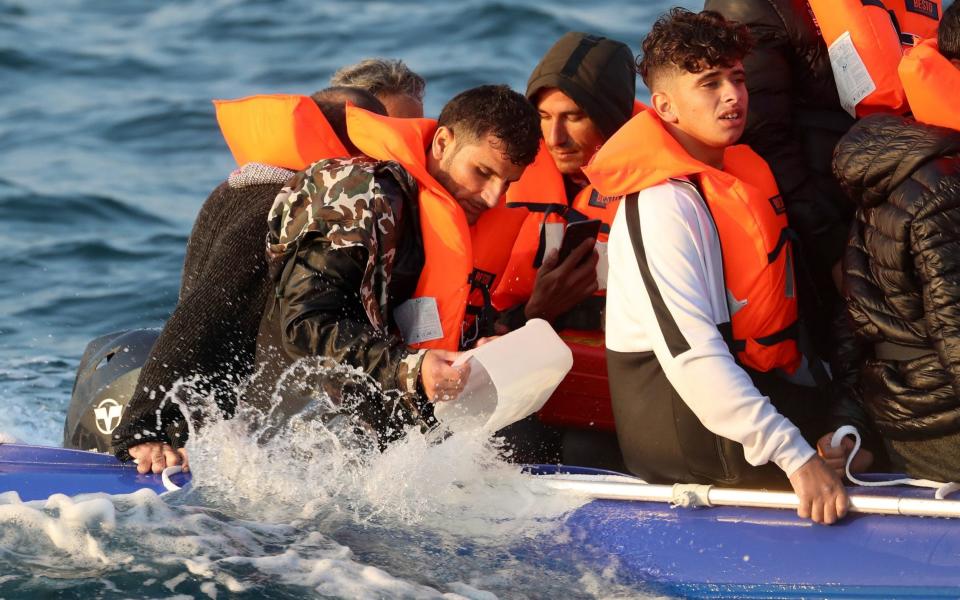Boris Johnson pledges new laws to tackle migrants crossing Channel once Brexit transition ends

Boris Johnson has pledged to create new laws to tackle migrants crossing the English Channel once the Brexit transition period comes to an end, as the RAF deployed an aircraft to assist Border Force for the first time.
The Prime Minister conceded that it was “very, very difficult” to return migrants who arrive in the UK from France via the Channel and said the UK would need to “look at the legal framework that we have” that allows such a situation to develop.
However Mr Johnson added that his Government needed to look at what it can do to “change” the “panoply of laws that an illegal immigrant has at his or her disposal that allows them to stay here”.
Record numbers of asylum seekers have crossed the Channel to reach the UK this year, with nearly 600 people having made the journey by boat in the last few days alone.
On Tuesday the Immigration minister, Chris Philp, will hold talks with his French counterparts to discuss the evolving situation.
When Mr Philp is in Paris it will be "to seek to agree stronger measures with them, including interceptions and returns, to tackle this shared challenge head on".
On Monday the UK Government was accused of exercising “political measure” following speculation that the Royal Navy would be deployed to help with the crisis.
Pierre-Henri Dumont, the MP for Calais, said involving the navy was “to show some kind of resource to fight against smugglers and illegal crossings in the Channel, but technically speaking that won't change anything”.
His comments come after the RAF for the first time assisted Border Force by deploying its Atlas A400M transport aircraft to survey the Channel on Monday morning on orders authorised by Ben Wallace, the Defence Secretary, following the Home Office's formal request for help from the MoD.
Priti Patel, who travelled to Dover on Monday to “see how Border Force and other operational partners are tirelessly dealing with the unacceptable number of illegal small boat crossings” pledged to make this “incredibly dangerous route unviable".
The Prime Minister's official spokesman cited the “inflexible and rigid” Dublin Regulations regarding Migrants as one obstacle to reducing the numbers arriving, but said by December 31st this would no longer be the case.
“There is a time limit placed on returns, it's something which can be abused by both migrants and their lawyers to frustrate the returns of those who have no right to be here,” he said.
“At the end of this year we will no longer be bound by the EU's laws so can negotiate our own returns policy.”
A Home Office source said that once the UK is "no longer bound by Dublin after the transition", then "we will be able to negotiate our own bilateral returns agreement from the end of this year".
Under EU law an Asylum Seeker who enters the European Union should have their claim decided in the first country of entry, where they are also fingerprinted. If the person then moves onto another country the Dublin framework allows them to be sent back to their point of entry for their asylum claim to be determined there.
Steve Peer, professor of Law at the University of Essex and research investigator for The UK in a Changing Europe, suggested a “political tradeoff” would be required to create a new arrangement.
“Nothing really changes unless you get other countries to agree. There would have to be a trade off of some kind.”
Mr Peer suggested “perhaps more money would be put on the table”, or “something else in the EU talks”, in order to find a middle ground between the countries.
In a letter to Ms Patel 23 Tory MPs and two peers said the UK should refuse to sign up to a "similar agreement" to Dublin after December.
However, Colin Yeo, an immigration lawyer, told The Daily Telegraph that as “imperfect” as the UK Government might consider the Dublin arrangement, it was “the only current legal basis for getting another country to accept back an asylum seeker”.
“I can’t see what the Dublin Agreement is going to be replaced with and it doesn’t feel like there is very much prospect of it being replaced. Why would the French agree to taking asylum seekers back?”
Mr Johnson was later criticised for “inflammatory” language he used when discussing migrants after he described the Channel crossings as a "very bad and stupid and dangerous and criminal thing to do".

 Yahoo News
Yahoo News 